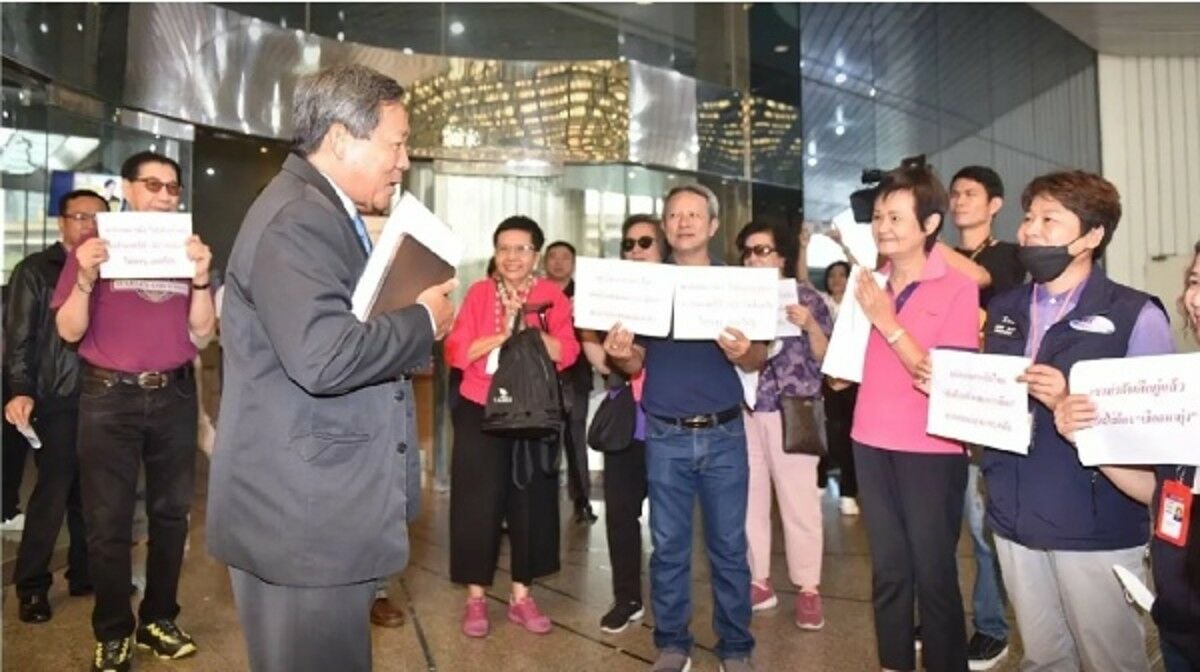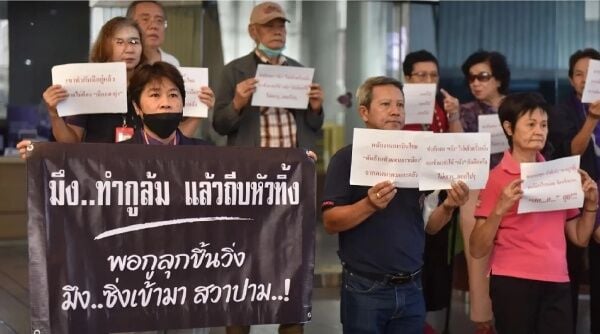THAI union fights to keep government out of airline’s rehab plan

Thai Airways International (THAI) staff are up in arms, rallying against what they see as an attempt by the government to seize control of the airline under the guise of a rehabilitation plan amendment.
The airline’s labour union staged a peaceful but determined protest outside THAI headquarters yesterday, November 8, holding up placards and calling on creditors to reject the proposed changes, which they fear could clip the wings of Thailand’s national carrier.
The demonstration unfolded as creditors met with THAI representatives to discuss the Finance Ministry’s controversial proposal. The plan seeks to appoint two government officials—Polchak Nimwatana, deputy director of the State Enterprise Policy Office, and Panya Chupanich, director of the Office of Transport and Traffic Policy and Planning—as new managers to the airline’s rehabilitation team. But the union and some creditors argue this could pave the way for political meddling, particularly in aircraft purchasing decisions, which they worry could compromise the airline’s autonomy and competitiveness on the world stage.
A union representative passionately read a statement urging politicians to “stop destroying the national airline,” asserting that “corruption in politics” had led to the airline’s financial troubles. He noted that after filing for bankruptcy protection in 2019, THAI staff had worked tirelessly to return the airline to profitability, reported The Nation.
He argued that “THAI can leave the rehabilitation process in mid-2025 as planned, without interference from the government.”
The union’s statement underscored a firm stance: “We oppose the appointment of two government officials as business rehabilitation managers.”
It concluded by urging that THAI employees—boasting over 60 years of industry expertise—be allowed to guide the airline’s recovery, “without interference or political exploitation as seen in the past.”

UPDATE: Thai Airways reshuffle: Finance Ministry calls for new managers
Thailand’s Finance Ministry is set to shake up Thai Airways International Plc (THAI)‘s rehabilitation plan, nominating two high-profile officials to join the team managing the troubled national airline’s comeback. In a bid to secure its position as THAI’s primary creditor, the ministry will propose these candidates at a crucial meeting with debtors on Friday, November 8.
The nominees, Polchak Nimwatana, deputy director of the State Enterprise Policy Office (SEPO), and Panya Chupanich, director of the Office of Transport and Traffic Policy and Planning (OTP), both bring government clout to THAI’s recovery efforts.
This shift follows the resignation of two of the five current managers, leaving former Energy Minister Piyasvasti Amranand, Fiscal Policy Office director Pornchai Thirraveja, and former THAI president Chansin Treenuchagron holding the reins.
The restructuring meeting on Friday will also address the airline’s capital plan, specifically a proposal to reduce share value to offset the company’s crushing 60-billion-baht debt. If the majority of debtors approve, the reshuffled management board will consist of three government-backed members, two from the Finance Ministry.
This growing influence has stirred up concerns among analysts that the ministry could use its sway over the debt-to-equity swap, potentially setting a favourable price for state-owned debtors.
According to an insider, there’s fear that this will place THAI’s rehabilitation in political hands, with the new board of directors potentially under ministry influence. Critics argue that any political manoeuvring could compromise THAI’s independence just as it nears recovery.
THAI, which declared bankruptcy in 2019 with 245 billion baht in debt, secured a green light from the Cabinet in 2020 to proceed under the Bankruptcy Act. With the Central Bankruptcy Court’s approval in 2021, THAI has been targeting revenue and exploring rights offerings to exit the rehabilitation process. The airline’s fate now rests heavily on the Finance Ministry’s proposed new leadership, reported The Nation.
ORIGINAL STORY: Thai Airways plans rehabilitation exit by mid-2025, banks to benefit
Creditors of Thai Airways International (THAI), particularly Bangkok Bank (BBL) and Krungthai Bank (KTB), are set to benefit from the airline’s planned exit from its rehabilitation scheme by mid-2025. The banks are being provided with several options for debt repayment, according to analysts.
In recent reports submitted to the Stock Exchange of Thailand (SET) and the Securities and Exchange Commission, management for Thai Airways anticipates positive shareholder equity by February next year, with preparations to exit the rehabilitation plan slated for April.
Approval from the Central Bankruptcy Court for THAI’s exit from the rehabilitation plan is expected in May. Subsequently, the airline’s shares could resume trading on the SET by the end of June.
Chalie Kueyen, a banking analyst at KGI Securities (Thailand), noted that BBL and KTB are among 36 entities with outstanding debts amounting to 404 billion baht. These banks fall under the majority debtor group (Group 6), carrying around 31 billion baht in unsecured debt.
KGI believes both BBL and KTB have allocated provisions for their lending exposure since THAI’s restructuring plan was filed in 2020, said Chalie.
“We learned in our talks with THAI’s management that the debt to banks has been serviced regularly since the rehabilitation plan was established five years ago with an undisclosed lending rate.”
THAI’s exit strategy involves mandatory and voluntary conversion of debt into equity for certain creditors, including financial institutions, bondholders, the Ministry of Finance, and state enterprises, at a conversion rate of 2.54 baht per share. Creditors in Group 6 have multiple options for debt repayment, including converting debt into equity and extending the payment period by up to 15 years with an interest rate of 1.5%, reported Bangkok Post.
New shares incoming
Weerapat Wonk-Urai, a bank analyst at CGS International Securities, mentioned that THAI will undergo capital restructuring in the fourth quarter of this year as part of the court-ordered business rehabilitation plan. This will include issuing 9.8 billion new shares to support the debt-to-equity conversion.
“A share offering would be extended to THAI’s existing shareholders, employees, and investors through private placement. Following that, the par value will be reduced to eliminate accumulated losses.”
BBL and KTB have loan exposures to THAI amounting to 11.9 billion baht and 5.8 billion baht, respectively. BBL’s ownership in THAI is expected to increase from 0.4% in the second quarter of 2024 to 5.8% after the debt-to-equity conversion, Wonk-Urai said.
“We believe both banks have classified loans to THAI as non-performing loans (NPLs). If THAI’s loans are upgraded to performing loans, we anticipate BBL’s NPL ratio to decline from 3.64% in the second quarter of 2024 to 3.18%, with its NPL coverage ratio rising from 283% to 321%.”
KTB’s NPL ratio is projected to decrease from 3.85% to 3.59%, and its NPL coverage ratio is expected to increase from 181% to 192%, according to Weerapat.
Latest Thailand News
Follow The Thaiger on Google News:


























